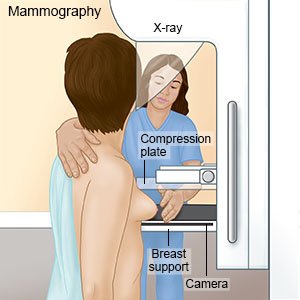Breast Self Exam for Women
Medically reviewed by Drugs.com. Last updated on Sep 1, 2024.
What is a breast self-exam (BSE)?
A BSE is a way to check your breasts for lumps and other changes. Regular BSEs can help you know how your breasts normally look and feel. Most breast lumps or changes are not cancer, but you should always have them checked by a healthcare provider. Your healthcare provider can also watch you do a BSE and can tell you if you are doing your BSE correctly.
Why should I do a BSE?
Breast cancer is the most common type of cancer in women. Even if you have mammograms, you may still want to do a BSE regularly. If you know how your breasts normally feel and look, it may help you know when to contact your healthcare provider. Mammograms can miss some cancers. You may find a lump during a BSE that did not show up on a mammogram.
When should I do a BSE?
If you have periods, you may want to do your BSE 1 week after your period ends. This is the time when your breasts may be the least swollen, lumpy, or tender. You can do regular BSEs even if you are breastfeeding or have breast implants.
How should I do a BSE?
 |
- Look at your breasts in a mirror. Look at the size and shape of each breast and nipple. Check for swelling, lumps, dimpling, scaly skin, or other skin changes. Look for nipple changes, such as a nipple that is painful or beginning to pull inward. Gently squeeze both nipples and check to see if fluid (that is not breast milk) comes out of them. If you find any of these or other breast changes, contact your healthcare provider. Check your breasts while you sit or stand in the following 3 positions:
- Hang your arms down at your sides.
- Raise your hands and join them behind your head.
- Put firm pressure with your hands on your hips. Bend slightly forward while you look at your breasts in the mirror.
- Lie down and feel your breasts. When you lie down, your breast tissue spreads out evenly over your chest. This makes it easier for you to feel for lumps and anything that may not be normal for your breasts. Do a BSE on one breast at a time.
- Place a small pillow or towel under your left shoulder. Put your left arm behind your head.
- Use the 3 middle fingers of your right hand. Use your fingertip pads, on the top of your fingers. Your fingertip pad is the most sensitive part of your finger.
- Use small circles to feel your breast tissue. Use your fingertip pads to make dime-sized, overlapping circles on your breast and armpits. Use light, medium, and firm pressure. First, press lightly. Second, press with medium pressure to feel a little deeper into the breast. Last, use firm pressure to feel deep within your breast.
- Examine your entire breast area. Examine the breast area from above the breast to below the breast where you feel only ribs. Make small circles with your fingertips, starting in the middle of your armpit. Make circles going up and down the breast area. Continue toward your breast and all the way across it. Examine the area from your armpit all the way over to the middle of your chest (breastbone). Stop at the middle of your chest.
- Move the pillow or towel to your right shoulder, and put your right arm behind your head. Use the 3 fingertip pads of your left hand, and repeat the above steps to do a BSE on your right breast.
What else can I do to check for breast problems or cancer?
Talk to your healthcare provider about mammograms. A mammogram is an x-ray of your breasts to screen for breast cancer or other problems. Your provider can tell you the benefits and risks of mammograms. The timing depends on your risk factors for breast cancer. Experts recommend a mammogram every 2 years from age 40 to 74 if you are at average risk. You may need to start earlier and get a yearly mammogram if you are at high risk. Mammograms are usually done every 1 to 2 years until age 74. You may need other tests if you have dense (thick) breast tissue. Examples include an ultrasound, MRI, or digital breast tomosynthesis (DBT). Your provider can give you more information about these tests, if needed.
 |
When should I call my doctor?
- You find any lumps or changes in your breasts.
- You have breast pain or fluid coming from your nipples.
- You have questions or concerns or concerns about your condition or care.
Care Agreement
You have the right to help plan your care. Learn about your health condition and how it may be treated. Discuss treatment options with your healthcare providers to decide what care you want to receive. You always have the right to refuse treatment. The above information is an educational aid only. It is not intended as medical advice for individual conditions or treatments. Talk to your doctor, nurse or pharmacist before following any medical regimen to see if it is safe and effective for you.© Copyright Merative 2024 Information is for End User's use only and may not be sold, redistributed or otherwise used for commercial purposes.
Further information
Always consult your healthcare provider to ensure the information displayed on this page applies to your personal circumstances.
